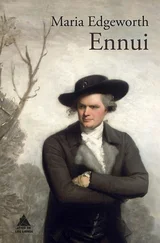“I never will oblige you, my lord, that you may depend upon,” cried her ladyship, with a look of indignant contempt.
His lordship whistled, rang for his horses, and looked at his nails with a smile. Belinda, shocked and in a great confusion, rose to leave the room, dreading the gross continuance of this matrimonial dialogue.
“Mr. Hervey, my lady,” said a footman, opening the door; and he was scarcely announced, when her ladyship went forward to receive him with an air of easy familiarity.—“Where have you buried yourself, Hervey, this age past?” cried she, shaking hands with him: “there’s absolutely no living in this most stupid of all worlds without you.—Mr. Hervey—Miss Portman—but don’t look as if you were half asleep, man—What are you dreaming of, Clarence? Why looks your grace so heavily to-day?”
“Oh! I have passed a miserable night,” replied Clarence, throwing himself into an actor’s attitude, and speaking in a fine tone of stage declamation.
“What was your dream, my lord?
I pray you, tell me,”
said her ladyship in a similar tone.—Clarence went on—
“O Lord, methought what pain it was to dance!
What dreadful noise of fiddles in my ears!
What sights of ugly belles within my eyes! —— Then came wandering by, A shadow like a devil, with red hair, ‘Dizen’d with flowers; and she bawl’d out aloud, Clarence is come; false, fleeting, perjured Clarence!”
“O, Mrs. Luttridge to the life!” cried Lady Delacour: “I know where you have been now, and I pity you—but sit down,” said she, making room for him between Belinda and herself upon the sofa, “sit down here, and tell me what could take you to that odious Mrs. Luttridge’s.”
Mr. Hervey threw himself on the sofa; Lord Delacour whistled as before, and left the room without uttering a syllable.
“But my dream has made me forget myself strangely,” said Mr. Hervey, turning to Belinda, and producing her bracelet: “Mrs. Stanhope promised me that if I delivered it safely, I should be rewarded with the honour of putting it on the owner’s fair arm.” A conversation now took place on the nature of ladies’ promises—on fashionable bracelets—on the size of the arm of the Venus de Medici—on Lady Delacour’s and Miss Portman’s—on the thick legs of ancient statues—and on the various defects and absurdities of Mrs. Luttridge and her wig. On all these topics Mr. Hervey displayed much wit, gallantry, and satire, with so happy an effect, that Belinda, when he took leave, was precisely of her aunt’s opinion, that he was a most uncommonly pleasant young man.
Clarence Hervey might have been more than a pleasant young man, if he had not been smitten with the desire of being thought superior in every thing, and of being the most admired person in all companies. He had been early flattered with the idea that he was a man of genius; and he imagined that, as such, he was entitled to be imprudent, wild, and eccentric. He affected singularity, in order to establish his claims to genius. He had considerable literary talents, by which he was distinguished at Oxford; but he was so dreadfully afraid of passing for a pedant, that when he came into the company of the idle and the ignorant, he pretended to disdain every species of knowledge. His chameleon character seemed to vary in different lights, and according to the different situations in which he happened to be placed. He could be all things to all men—and to all women. He was supposed to be a favourite with the fair sex; and of all his various excellencies and defects, there was none on which he valued himself so much as on his gallantry. He was not profligate; he had a strong sense of honour, and quick feelings of humanity; but he was so easily led, or rather so easily excited by his companions, and his companions were now of such a sort, that it was probable he would soon become vicious. As to his connexion with Lady Delacour, he would have started with horror at the idea of disturbing the peace of a family; but in her family, he said, there was no peace to disturb; he was vain of having it seen by the world that he was distinguished by a lady of her wit and fashion, and he did not think it incumbent on him to be more scrupulous or more attentive to appearances than her ladyship. By Lord Delacour’s jealousy he was sometimes provoked, sometimes amused, and sometimes flattered. He was constantly of all her ladyship’s parties in public and private; consequently he saw Belinda almost every day, and every day he saw her with increasing admiration of her beauty, and with increasing dread of being taken in to marry a niece of “the catch-match-maker ,” the name by which Mrs. Stanhope was known amongst the men of his acquaintance. Young ladies who have the misfortune to be conducted by these artful dames, are always supposed to be partners in all the speculations, though their names may not appear in the firm. If he had not been prejudiced by the character of her aunt, Mr. Hervey would have thought Belinda an undesigning, unaffected girl; but now he suspected her of artifice in every word, look, and motion; and even when he felt himself most charmed by her powers of pleasing, he was most inclined to despise her, for what he thought such premature proficiency in scientific coquetry. He had not sufficient resolution to keep beyond the sphere of her attraction; but, frequently, when he found himself within it, he cursed his folly, and drew back with sudden terror. His manner towards her was so variable and inconsistent, that she knew not how to interpret its language. Sometimes she fancied, that with all the eloquence of eyes he said, “ I adore you , Belinda;” at other times she imagined that his guarded silence meant to warn her that he was so entangled by Lady Delacour, that he could not extricate himself from her snares. Whenever this last idea struck her, it excited, in the most edifying manner, her indignation against coquetry in general, and against her ladyship’s in particular: she became wonderfully clear-sighted to all the improprieties of her ladyship’s conduct. Belinda’s newly acquired moral sense was so much shocked, that she actually wrote a full statement of her observations and her scruples to her aunt Stanhope; concluding by a request, that she might not remain under the protection of a lady, of whose character she could not approve, and whose intimacy might perhaps be injurious to her reputation, if not to her principles.
Mrs. Stanhope answered Belinda’s letter in a very guarded style; she rebuked her niece severely for her imprudence in mentioning names in such a manner, in a letter sent by the common post; assured her that her reputation was in no danger; that she hoped no niece of hers would set up for a prude—a character more suspected by men of the world than even that of a coquette; that the person alluded to was a perfectly fit chaperon for any young lady to appear with in public, as long as she was visited by the first people in town; that as to any thing in the private conduct of that person, and as to any private brouillieries between her and her lord, Belinda should observe on these dangerous topics a profound silence, both in her letters and her conversation; that as long as the lady continued under the protection of her husband, the world might whisper, but would not speak out; that as to Belinda’s own principles, she would be utterly inexcusable if, after the education she had received, they could be hurt by any bad examples; that she could not be too cautious in her management of a man of ——‘s character; that she could have no serious cause for jealousy in the quarter she apprehended, as marriage there could not be the object; and there was such a difference of age, that no permanent influence could probably be obtained by the lady; that the most certain method for Miss Portman to expose herself to the ridicule of one of the parties, and to the total neglect of the other, would be to betray anxiety or jealousy; that, in short, if she were fool enough to lose her own heart, there would be little chance of her being wise enough to win that of———, who was evidently a man of gallantry rather than of sentiment, and who was known to play his cards well, and to have good luck whenever hearts were trumps.
Читать дальше












